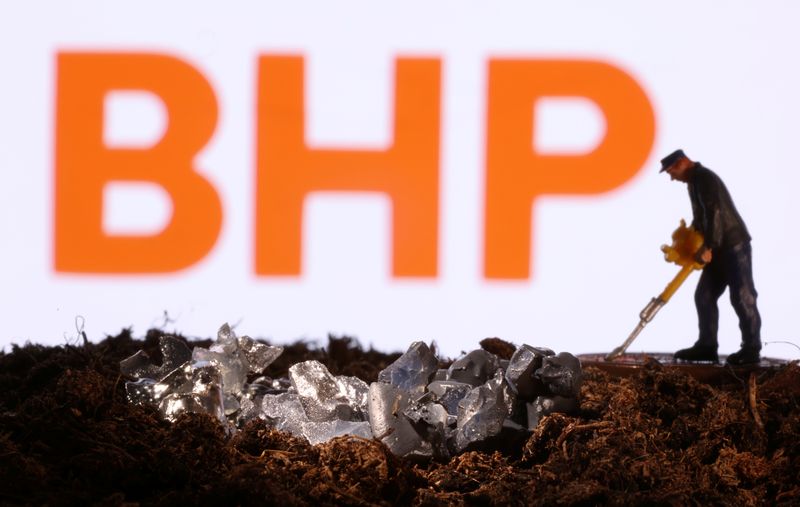By Pratima Desai and Eric Onstad
LONDON (Reuters) - Plans for two new nickel trading platforms to challenge the London Metal Exchange (LME) have been blown off course by BHP (ASX:BHP)'s planned suspension of its plants in Western Australia, which has prevented it from committing to them.
LME nickel was shunned by both consumers and producers after a March 2022 market meltdown, but the delays to the new platforms have enabled the 147-year-old exchange to fend off the potential challenges to its global nickel trading dominance.
Both initiatives were backed by BHP, the world's largest listed miner, which said last year that LME nickel did not represent the physical market and that reform was long overdue.
But for them to get off the ground and compete effectively with the LME, the new entrants needed BHP's nickel volumes. Both are now looking for other sources of supply, but had counted on starting off with BHP committing its nickel to their platforms.
UK-based Global Commodities Holdings Limited (GCHL) announced plans to launch a physical nickel platform months after the 2022 nickel debacle. Prices surged to records above $100,000 a metric ton in just a few hours before trading was suspended, sending shockwaves across other markets.
And last year, Abaxx Technologies Inc, which owns a new Singapore-based commodities exchange, also announced plans to launch the world's first contract for nickel sulphate, which is used to manufacture electric vehicle batteries.
But both GCHL and Canada-listed Abaxx were wrong-footed by BHP's decision to suspend the Kwinana nickel sulphate refinery and other facilities in Western Australia supplying nickel products, two sources with knowledge of the matter told Reuters.
Australia-based BHP declined to comment.
"BHP can't publicly commit to either platform at the moment. (It's) not a good look when you've recently announced the shuttering of nickel operations," one of the sources said.
BHP has not committed to either project but is a shareholder in GCHL and will eventually join the nickel platform which is headed by ex-LME CEO Martin Abbott, the sources said. GCHL said in March it would launch its physical metals platform in April.
"It is fair to say that GCHL's nickel project has been disrupted by the BHP decision to shutter its Western Australian nickel production," said GCHL chief executive Martin Abbott.
"BHP was an important contributor to the product design, and fortunately the underlying standard contract is completed and fully usable," Abbott added.
'BROADER ECOSYSTEM'
BHP cited an oversupplied nickel market and plunging prices of the material mostly used to make stainless steel when it said it will suspend its Western Australian operations from October.
Nickel prices on the LME have dropped more than 80% since their March 2022 peak, partly due to rising stocks since August 2023 in LME registered warehouses.
BHP noted the GCHL and Abaxx initiatives in a commodities outlook published on its website in February.
"BHP is monitoring all these developments, and we are engaging constructively with the broader ecosystem to try to help build a more transparent, efficient and robustly independent pricing mechanism for this critical mineral – in its many traded forms," it said.
Abaxx started trading liquefied natural gas (LNG) and carbon futures in June, but delayed the launch of nickel sulphate.
At the time, a company official said the nickel sulphate contract would likely be launched in a matter of weeks.
"The nickel industry has experienced significant shifts recently, which in turn has broader impact on the market and our contract design," Abaxx said in response to a query.
"We are continuously engaging with industry stakeholders to ensure that our contract specifications are aligned with market realities."
A third source said having a major nickel sulphate producer leave the market has changed the landscape and that Abaxx was looking for others to provide liquidity.
"You want to make sure that what could be delivered into that will be acceptable to buyers," the source said.
More than 50% of global nickel supply, estimated at around 3.5 million tons this year, will come from Indonesia where it is mostly produced by Chinese firms. Most nickel produced in Indonesia emits large amounts of carbon.

"The predominance of Indonesian/China origin material means we have to re-orient the platform to include nickel from all non-sanctioned origins," GCHL's Abbott said.
"Once fully operational the platform will show the difference in pricing, if any, between nickel from different origins," he added.